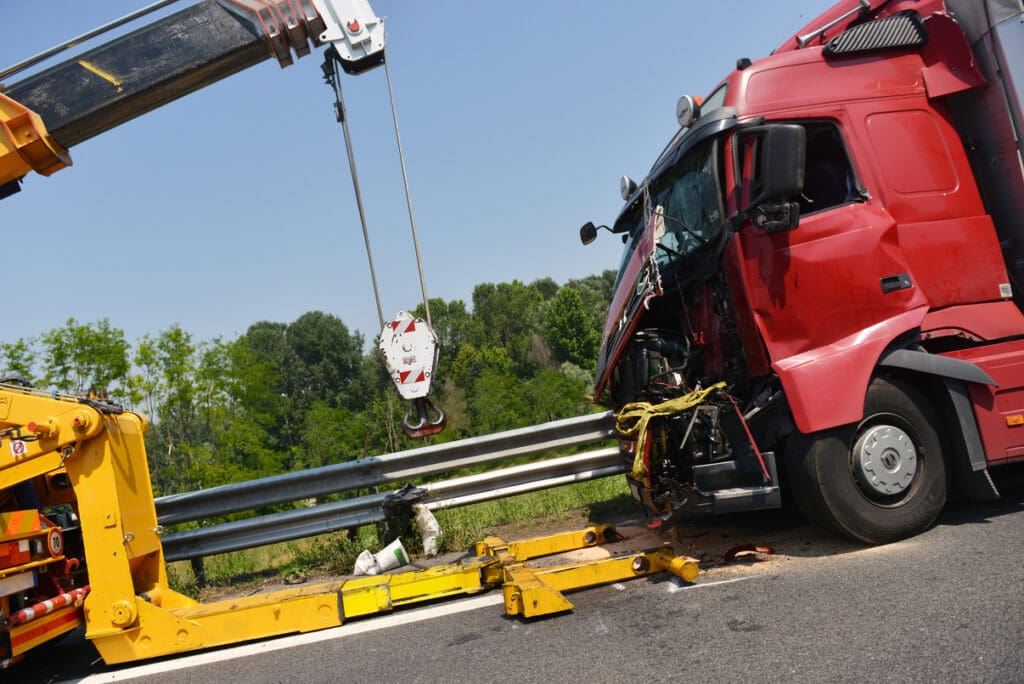For various reasons, collisions involving trucks differ from those involving only passenger cars. These factors include the size and weight of the truck, the severity of the injuries victims frequently sustain, and federal laws controlling truckers and transportation businesses.
Because of this, truck accident lawsuits include more complex issues, necessitating a comprehensive investigation by a qualified truck accident attorney.
Additionally, to hold the truck driver and trucking firm accountable for paying you, you will want the preservation of evidence specific to these circumstances.

Evidence Used in Truck Accident Claims
Hours-of-Service Logs
The FMCSA mandates that truck drivers and trucking companies maintain thorough operations logs and follow driving regulations.
Driver log books, computerized records, GPS units, mobile phone data, receipts and bills of lading, maintenance logs, and inspections are a few examples of possible evidence preservation.
Your trucking firm will be held accountable for the collision if you can show that their reckless behavior resulted in the accident due to a violation of the hour and service standards.
Pre-Trip Inspection Reports
Regarding safety inspections and maintenance repairs, trucks and other commercial vehicles are subject to rules and regulations.
The driver may operate the vehicle dangerously or with broken parts if the truck is not thoroughly inspected or repaired, which could raise the chance of an accident.
Cargo/Freight Manifest
Every item of cargo, together with its description, attributes, and final destination, is listed on a freight manifest.
According to the cargo/freight manifest, your accident may have occurred because the cargo exceeded the truck’s weight capacity or the driver or trucking business did not properly balance or secure the cargo.
Inspection and Maintenance Records for the Truck or Trailer
For one year at the location where they house the truck and six months after the truck leaves the carrier’s control through sale, trade-in, or other means, trucking companies are required by FMCSA to keep all inspection, repair, and maintenance records for each vehicle they own or lease.
These maintenance and inspection records might demonstrate that a tractor-trailer had a safety problem that wasn’t addressed, which might have had a role in the mishap.
Logs from the Truck’s Event Data Recorder
Although many do, federal law does not mandate that trucks carry event data recorders. Logs from event data recorders may come in use when looking into and figuring out what caused a transportation accident.
Employment and Driving Records
Examining the driver’s employment history and driving records may reveal information about prior collisions or safety incidents. If the driver’s records indicate a history of reckless driving or other bad habits, this information may prove negligent hiring by a trucking company.
Results of a Drug/Alcohol Test Performed on the Truck Driver after the Accident.
Commercial truck drivers are not allowed to drink alcohol within four hours of reporting for duty or operating a commercial vehicle, according to FMCSA regulations.
Additionally, alcohol is not allowed in the taxi. A truck driver can be subject to drug or alcohol testing following an accident. If they are confirmed, they provide substantial proof of the truck driver’s negligence.
Post-Accident Vehicle Inspection and Repair Reports
To ascertain whether a technical flaw or poor maintenance by the driver or carrier contributed to the collision, your attorney may arrange for a mechanic to examine the tractor-trailer’s damage.
Recommended Article: Negligence Elements
Steps One Should Take After A Truck Accident To Preserve Evidence
Time is critical for evidence preservation following an accident. A fair and just resolution is frequently ensured by gathering and keeping evidence. The likelihood of making the correct decisions is increased with more precise and thorough evidence.
Dealing with witnesses and insurance companies after an accident can be difficult.
- Call the Police
If the incident occurs on a highway, the 911 operator will route your call to the proper emergency response team and law enforcement.
- Obtain Medical Care
Even if you don’t believe you are hurt, have a medical examination for you and your passengers. You may have had injuries that take time to show symptoms.
- Take Pictures of the Proof There.
Only do this if you are not injured and it is safe to get out of your car and move around.
- Write Down Contact Information for Witnesses
Anyone who witnessed or observed the crash in any capacity is considered a “witness.” It might be a bystander, an occupant of a nearby non-involved vehicle, or someone in one of the affected vehicles.
- Get your Vehicle Appraised
Even though your car can seem to have just minor damage, like our bodies, sometimes internal harm is hidden from the untrained eye.
What You Need to Document After a Truck Accident
The relevant data must be gathered as quickly as possible after an accident. It makes sense that you might be unhappy after a vehicle mishap, but attempt to obtain the following information before you engage a lawyer:
- A Full Report from the Police
- The Witness Statements and Information of the Other Driver
- Pictures from the collision Medical Records for Any Services Received
Recommended Article: Amazon Truck Delivery
Mistakes to Avoid when pursuing a truck accident claim
You need to know when to employ a truck accident lawyer and what not to do to file a claim after a truck accident. These are the five typical mistakes.
- Delaying Getting Medical Care
Truck accident victims frequently leave the scene of the collision believing their injuries were minimal.
The person exhibits symptoms a few days or weeks following the accident. In addition, insurance companies can start to doubt the claim’s validity if medical attention is delayed.
- Neglecting to Gather Proof
Collect evidence from the accident scene, even if you are not hurt. It would be wise to call a loved one for assistance.
- Not Obtaining a Police Report
Failure to file a police report after a truck driver causes a tractor-trailer collision will harm your ability to recover damages from the truck accident.
- Communication with an Insurance Firm
To protect your legal rights, never consent to sign any paperwork.
- Not Seeking to Pay Actively
You have more time to enhance your claim and get a higher settlement if you preserve evidence for your truck accident claim as soon as possible.
Ensuring a Strong Truck Accident Claim with Proper Evidence Preservation
Should you need any assistance or information regarding preserving evidence in trucking accidents, Coluccio Law is ready to assist you!
Recommended Article: Actual Settlement Amounts Truck Accidents


